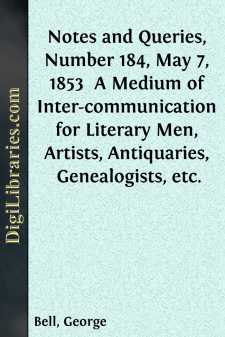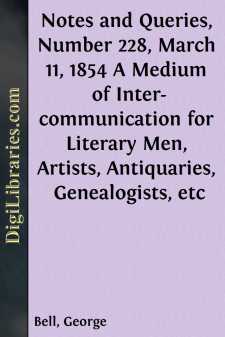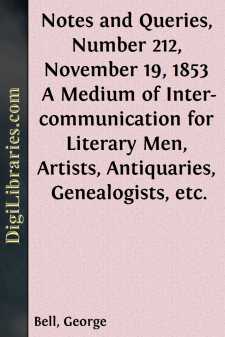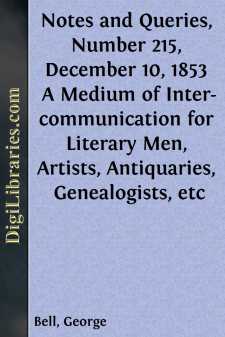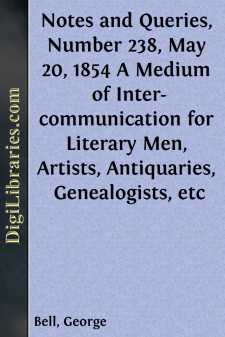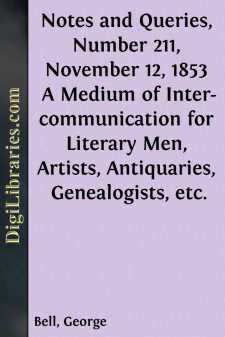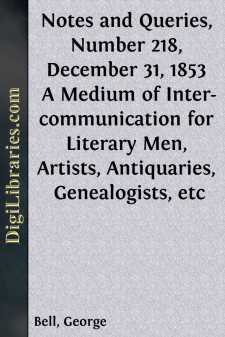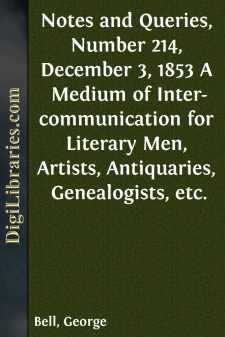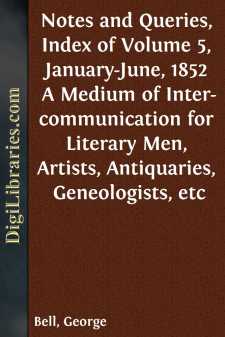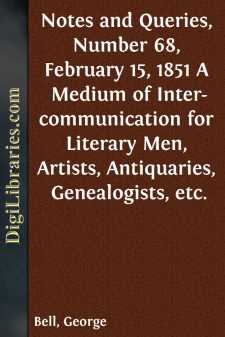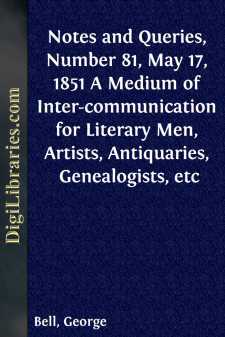Categories
- Antiques & Collectibles 13
- Architecture 36
- Art 48
- Bibles 22
- Biography & Autobiography 813
- Body, Mind & Spirit 142
- Business & Economics 28
- Children's Books 16
- Children's Fiction 13
- Computers 4
- Cooking 94
- Crafts & Hobbies 4
- Drama 346
- Education 46
- Family & Relationships 57
- Fiction 11829
- Games 19
- Gardening 17
- Health & Fitness 34
- History 1377
- House & Home 1
- Humor 147
- Juvenile Fiction 1873
- Juvenile Nonfiction 202
- Language Arts & Disciplines 88
- Law 16
- Literary Collections 686
- Literary Criticism 179
- Mathematics 13
- Medical 41
- Music 40
- Nature 179
- Non-Classifiable 1768
- Performing Arts 7
- Periodicals 1453
- Philosophy 64
- Photography 2
- Poetry 896
- Political Science 203
- Psychology 42
- Reference 154
- Religion 513
- Science 126
- Self-Help 84
- Social Science 81
- Sports & Recreation 34
- Study Aids 3
- Technology & Engineering 59
- Transportation 23
- Travel 463
- True Crime 29
Notes and Queries, Number 184, May 7, 1853 A Medium of Inter-communication for Literary Men, Artists, Antiquaries, Genealogists, etc.
by: George Bell
Categories:
Description:
Excerpt
OLD POPULAR POETRY: "ADAM BELL, CLYM OF THE CLOUGH, AND WILLIAM OF CLOWDESLY."
I have very recently become possessed of a curious printed fragment, which is worth notice on several accounts, and will be especially interesting to persons who, like myself, are lovers of our early ballad poetry. It is part of an unknown edition of the celebrated poem relating to the adventures of Adam Bell, Clym of the Clough, and William of Cloudesly.
There are (as many of your readers will be aware from Ritson's small volume, Pieces of Ancient Popular Poetry, 8vo. 1791) two old editions of Adam Bell, &c., one printed by William Copland, without date, and the other by James Roberts in 1605. The edition by Copland must have preceded that by Roberts by forty or fifty years, and may have come out between 1550 and 1560; the only known copy of it is among the Garrick Plays (at least it was so when I saw it) in the British Museum. The re-impression by Roberts is not very uncommon, and I think that more than one copy of it is at Oxford.
When Copland printed the poem, he did not enter it at Stationers' Hall; comparatively few of his publications, generally of a free, romantic, or ludicrous character, were licensed, and he was three times fined for not first obtaining the leave of the Company. Nevertheless, we do find an entry of a "book" called "Adam Bell," &c., among the memoranda belonging to the year 1557-8, but it was made at the instance, not of Copland, but of John Kynge, in this form:
"To John Kynge, to prynte this boke called Adam Bell, &c., and for his lycense he geveth to the howse"—
What sum he gave is not stated. Again, we meet with another notice of it in the same registers, under the date of 1581-2, when John Charlwood was interested in the undertaking. I mention these two entries principally because neither Ritson nor Percy were acquainted with them; but they may be seen among the extracts published by the Shakspeare Society in 1848 and 1849.
No impressions by Kynge or Charlwood having come down to us, we have no means of knowing whether they availed themselves of the permission granted at Stationers' Hall; and, unless I am deceived, the fragment which occasions this Note is not from the presses of either of them, and is of an earlier date than the time of Copland; the type is much better, and less battered, than that of Copland; at the same time it has a more antique look, and in several respects, which I am about to point out, it furnishes a better text than that given by Ritson from Copland's edition, or by Percy with the aid of his folio manuscript. I am sorry to say that it only consists of a single sheet; but this is nearly half the production, and it comprises the whole of the second, and two pages of the third "fit." The first line and the last of the portion in my hands, testify to the greater antiquity and purity of the text there found; it begins—
"These gates be shut so wonderly well;"
and it ends,
"Tyll they came to the kynge's palays."
It is "wonderous well" in Copland's impression, and palace is there spelt "pallace," a more modern form of the word than palays....


